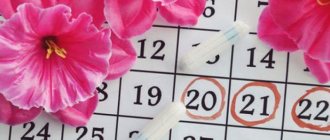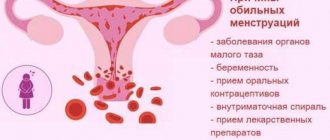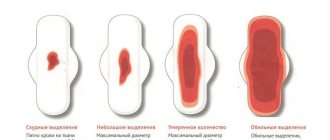Oral contraceptives (OC) are a popular and modern way of protecting against unwanted pregnancy. In addition, a number of gynecological diseases are treated with the help of these drugs.
But to prevent the negative consequences associated with the effects of hormones on the body, it is important not only to take OK on time, but also to correctly stop taking them when the need to use pills disappears.
How birth control pills affect the menstrual cycle
There are dozens of types of birth control pills (oral contraceptives, OK). They all contain varying levels of hormones that are released into a woman's body to prevent pregnancy. The hormones in birth control pills stop ovulation (the release of an egg from the ovary into the fallopian tube) and can affect menstruation and associated side effects. Many aspects of menstrual bleeding may be affected, and the effect may vary over time. Your periods may become longer or shorter, irregular, heavier or lighter than before. These side effects are common with any method of hormonal contraception, especially in the first few months of use.
Progesterone and estrogen, which are part of birth control pills, suppress the release of follicle-stimulating (FSH) and luteinizing hormones (LH), which are responsible for restarting the cycle after menstruation and ovulation.
The standard combined oral contraceptive pill consists of both the hormones progesterone and estrogen, taken daily for three weeks, followed by a pill-free week (or placebo pills), which causes “breakthrough bleeding” due to decreased hormone levels. Although little changes in appearance (menstrual bleeding in the 1st week of a 28-day cycle), persistently high levels of progesterone and estrogen in the body of a woman taking the pill actually cancel out the normal hormonal cycle that underlies ovulation.
There are a variety of birth control pill regimens available today, ranging from 24-day pills with active ingredients followed by 4 days of placebo, to extended-cycle regimens that can be taken for up to a year to completely stop menstrual bleeding.
Side effects are more common with progesterone-based pills (called mini-pills) compared to combination pills that also contain estrogen. When taking a “monophasic” pill (contains the same dose of hormones per day), the appearance of “spotting” is more common than when using a “triphasic” pill (different doses during the cycle).
Why no periods after stopping birth control pills?
If you decide to stop taking the pills, it may take some time for your cycle to return to normal. This period is individual for each woman. Some return to their normal menstrual cycle in a matter of days, while others take several months for their periods to regulate. In addition, each body reacts differently to changes associated with internal and external factors. Hormone levels fluctuate for many reasons. The absence of menstruation after discontinuation of OCs can be caused by the presence of at least one of the following negative factors:
- Stress increases the level of cortisol, which is also called the “stress hormone.” It affects the hypothalamus, a gland that controls many hormonal functions in the body. As a result, hormonal imbalance may occur. Stress also creates a vicious circle: a woman worries about a missed period, the level of hormones in her body fluctuates, which further reduces the likelihood of getting her period. That's why many doctors recommend taking a pregnancy test in such a situation - urine or blood - to restore peace of mind. Any situation that causes stress can trigger a cycle failure. Final exams, problems at work, illness of a loved one, moving - can cause a disorder in the monthly cycle.
- Long-term use of hormonal contraception. One of the effects of long-term use of hormonal birth control is the thinning of the lining of the uterus, the endometrium. This may eventually lead to no periods for some period.
- Sexual infections. The hormonal method protects a woman from unwanted pregnancy, but is not able to protect her from sexually transmitted infections. Ovarian dysfunction can develop even with a minor inflammatory process. This may affect your menstrual cycle when the drug is stopped.
- Diets. Excessive calorie restriction can lead to hormonal imbalance and negatively impact your menstrual cycle because the body will not receive the nutrients it needs to produce hormones properly.
- Dramatic weight loss. Did you know that cholesterol is needed to produce sex hormones? And this is so. An abnormally low percentage of body fat can wreak havoc on your hormones. Women who are overweight or underweight may experience a variety of hormonal problems, including missed periods.
- Excessive physical activity. Even in women who do not use OCs, excessive exercise can cause delayed or absent menstruation. Intense sports often disrupt hormonal levels and the menstrual cycle. Professional female athletes tend to suffer from amenorrhea, but even amateur athletes can experience this effect.
All organisms are different, and the specific effect after stopping contraception may depend on the symptoms that were observed in the woman before starting to take the pills. But some changes are general:
- More heavy and painful menstruation. If you had pain and heavy bleeding before you started using birth control, your problems are likely to return. Antispasmodics (No-shpa, Spazmalgon) or non-steroidal anti-inflammatory drugs (Ibuprofen) will help cope with pain and improve well-being. If this has not been observed before, you should wait 1-2 cycles, allowing the discharge to normalize after hormonal fluctuations due to discontinuation of the OC. Heavy periods that bother a woman for a longer period of time require additional examination by a gynecologist.
The first few menstruation after discontinuation of OC may be more abundant, later they should normalize
- PMS symptoms. The pill, especially some formulas, helps balance out hormonal chaos that can cause depression, anxiety and irritability. Without their action, symptoms may return.
- Cramps in the lower abdomen in the middle of the cycle. Most hormonal birth control methods work by preventing ovulation. Therefore, as your body returns to its natural functions, you may feel slight cramping in your lower abdomen as your ovary releases an egg. At the same time, periods may become more abundant than when using OK.
- Acne and unwanted hair. The pills can correct the hormonal imbalance that causes your skin to break out and hair to grow in unwanted places. But this is a temporary solution: as soon as you stop taking the OC, the hormones can go out of whack again, which will bring back these problems.
- Increased sexual desire. A small percentage of women find that the pill reduces their libido. After stopping contraceptives, they note an increase in interest in sexual activity.
- Reduced frequency of migraines. If the pills are causing you headaches, you will find relief when you stop taking them.
Most symptoms that begin after you stop taking birth control are temporary. After a few menstrual cycles, your body should regain its normal rhythm and your periods will return to normal.
Reasons for the absence of menstruation after discontinuation of OK - video
Negative sides
When taking oral contraceptives, you should not rely solely on reviews or advertisements. For example, gynecologists often prescribe the drug "Yarina", and many representatives of the fair sex begin to take it without consulting a specialist. This drug has almost no side effects and is suitable for almost everyone. However, you should not take contraceptives on your own without consulting a doctor, as this can lead to certain problems in the body:
- With uncontrolled use, excess weight gain is possible.
- Suitable only for women who are sexually active with one partner.
- Birth control pills are not recommended for smokers, as there is a high risk of blood clots forming in the blood vessels.
- The effect of oral contraceptives is reduced if you take sleeping pills or antibiotics at the same time.
Despite the fact that the drugs can be taken by almost everyone, they should be prescribed by a gynecologist after conducting certain studies. This is due to the fact that the level of hormone production varies from person to person. Only a specialist will be able to select the most suitable and effective drug that will not have side effects.
How long can a missed period last and what needs to be done?
Even if your periods were clockwork before you started using contraception, it may take several months for your period to even out after you stop taking the pill. And if irregular periods were the norm for you in the past, this problem is likely to return. The reliable schedule you enjoyed was only the result of hormone pills. If your periods stop altogether, it may take several months for them to return. Gynecologists recommend allowing the body to recover on its own for 3 months after stopping birth control pills. If your periods are absent or remain irregular after this period, consult your doctor to find out the cause.
Rule out possible pregnancy
Many women think it takes a long time to conceive after they stop taking the pill, but studies show they are about as likely to get pregnant almost immediately as women who used barrier methods (such as condoms). Up to 96% of women taking birth control pills become pregnant within a year. If a delay in menstruation causes concern and suspicion in a woman, it is recommended:
- take a blood test for hCG in the clinic (determines pregnancy already on the 6-8th day after fertilization of the egg);
- take a home pregnancy test (it will help detect pregnancy only at 3-4 weeks).
A home pregnancy test can be purchased at any pharmacy, but the result will be reliable only 3-4 weeks after conception
How to properly stop birth control pills
Most medical experts and doctors suggest not stopping birth control mid-cycle. Instead, it is recommended to finish the current packaging and not start a new one. This helps the body more easily return to its normal cycle. Also, if you stop taking birth control pills mid-cycle, you may experience cramping and spotting as early as two days after your last pill. Hormones obtained from the tablets are eliminated within two days. The body then tries to restore the natural menstrual cycle.
The absence of menstruation after stopping the OC should not cause immediate concern in a woman, since it is a variant of the norm. However, in some cases, this may indicate pregnancy, so a home pregnancy test or a blood test for hCG in a clinic is what will help clarify the situation.
- Author: Marina Shell
Rate this article:
- 5
- 4
- 3
- 2
- 1
(0 votes, average: 0 out of 5)
Share with your friends!
Planning a pregnancy
According to statistics, the longer the period of taking contraceptives, the longer it will take to restore fertility. If OCs are used for at least a year, pregnancy can occur after 1-3 months. after abandoning them. For women over 30, recovery may take 3-6 months. The reason for this phenomenon is that any contraceptives affect the natural processes of the female reproductive system and contribute to the appearance of abnormalities.
It is also worth considering the general well-being of the body, avoiding bad habits and taking a course of vitamins. This will help increase the likelihood of a quick pregnancy and reduce the risk of abnormalities during pregnancy.











